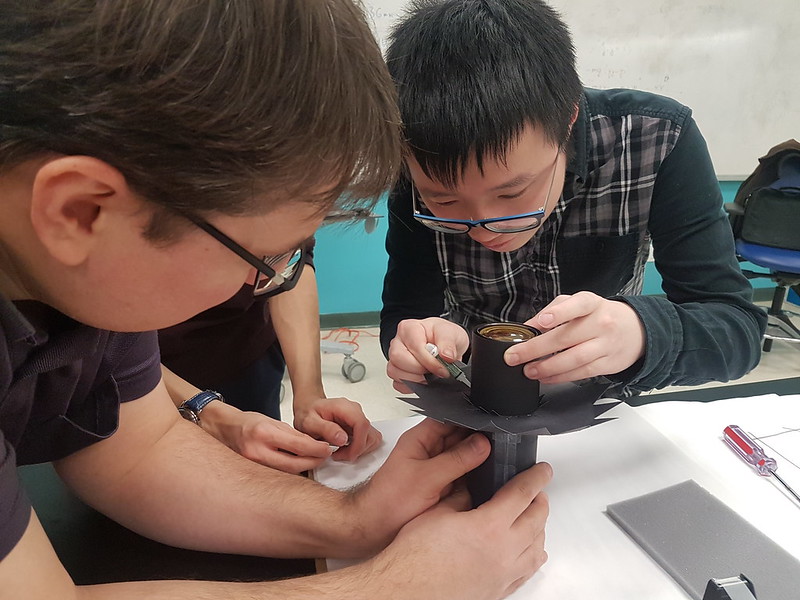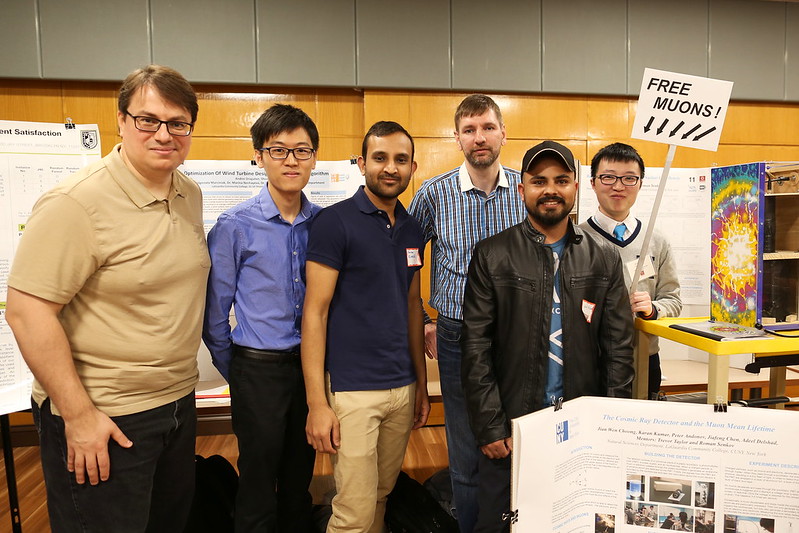by Jiafeng Chen

Jiafeng Chen
As a child growing up in a quiet southern seaside town in China, I was always curious about everything. The first moment mechanical engineering sparked my mind was when, for the very first time in my life, I boarded an airplane to the United States. When I heard the engine roar while at the same time lift people up against gravity and transport them from place to place, I marveled. That experience triggered my desire to learn more about the mechanisms behind such motions and the structure of these magnificent instruments. My mechanical engineering journey had begun!
With effort and drive, I managed to secure a spot at LaGuardia Community College and start my mechanical engineering studies. An immigrant, I acquired diverse knowledge while adapting myself to a new life. LaGuardia was a great starting point in my education; there were kind and patient professors and different programs to help me and other students explore our value. As we know, college is hard work, and we have multiple responsibilities to juggle while earning our degree. Nevertheless, at LaGuardia I had the wonderful chance to conduct and participate in various research projects. I pursued knowledge at every opportunity, even though my expectations and prior knowledge turned out to be the opposite of what I sought. I was privileged to work with Professor Tao Chen and Professor Roman Senkov, some of the greatest minds I have worked with so far. I worked with Professor Chen in a study of finite subdivision rule and rational map with parabolic orbifold, conducted as a part of the MaxIMA projects from the Mathematical Association of America (MAA). The research was in pure math, an area in which I had no prior knowledge or even a clue about what it entailed. To my surprise, I learned to grasp these new concepts and terminology even though I was just an undergrad student. During my introduction to this new field, I also learned the importance of being open minded and working diligently at whatever we put our minds to. The study's quite interesting findings were worth all our effort. From this work, I began to understand how a mathematician works.

LaGuardia students Peter Andonov and Jiafeng Chen are working on the cosmic ray detector © SPS Flickr
With Professor Raman Senkov, I participated in the study “Back-Shifted Fermi Gas Model and Nuclear Level Density.” Knowledge of nuclear level densities is critical to understanding nuclear reactions, their calculations, and practical applications. Initially, I found the field of study quite tricky and hard to understand, but by the end of the study and with Professor Senkov’s help, I learned how to approach the topic. The study introduced me to the world of statistical science and through the research, I learned Python, the computer language, and Linux, the computer operating system, and these skills have been invaluable to my life ever since. I gained great appreciation for technology and the world of computers, and I discovered a passion for coding. I also learned to perform data analysis, a critical skill that significantly influenced my undergraduate studies and future career.
To further improve my skills and experience, I also joined Professor Jing Fan and the research team from the City College of New York in examining polyacrylamide microgel behavior as it flows through the constrictive channel. The findings of Professor Fan’s study were crucial in providing a detailed account of thermodynamics and mechanics. My knowledge of microgels and their characterizations were deeply cemented by hands-on activities and first-hand information. I also learned how to handle experimental situations with precision and verifiability.
My learning was enhanced by the mistakes I made. Once I made a slight error made while preparing a sample gel to be used in a test. The gel ended up producing a pressure that was slightly higher than anticipated. The result was a weeklong scrutinization of the work that we had done in the experiment to understand the cause of the increased pressure. We later discovered that the gel had been stored longer than the recommended time before use. I marveled at such discoveries, and learned the importance of precision, quality control, and meticulousness, and that carelessness may influence results and increase the cost of studies in time and human resources-lessons I carry with me to this day.

Dr. Senkov's research group. LaGuardia Undergraduate Research Day, May 2018. © SPS Flickr
In 2017, I attended the Mathematical Association of America Metropolitan New York Meeting, the American Physical Society Meeting in 2018, and a biomedical research conference. The meetings and the conference opened my eyes to a broader perspective of what society and career entail. I was able to identify my drawbacks, which include inadequacies in data processing and analysis, and I devised a plan to improve my skills in these areas. My strategies included adding statistics and mathematics as my second major during my junior year, and these courses proved essential and offered great flexibility and efficiency. After that, research data analysis and interpretation became second nature; and I felt that I could deal with any problem in the process of my study.
For academic studies, preparing in advance is very important. I planned my educational path early in my sophomore year and decided to pursue my bachelor’s degree at Stony Brook University. There is a significant difference between a two-year and four-year college. The training I received at Stony Brook University successfully expanded my mental capacity and my knowledge in functional computations of fluid mechanics, heat transfer, and thermal designs. However, the internal combustion engines proved more interesting than the others as it was the bridge from a specialized field. Furthermore, I acquired skills and expertise in mechanics, thermodynamics, and aeronautics.
My mechanical engineering journey is still going on. I am now wiser and definitely more knowledgeable. My experiences helped me to identify the field of study that I love and enjoy. In addition to my studies, I have many great friends, and a strong social and professional network gained during my time in the University.
If there is anything I have learned is the importance of critical analysis of all situations. No problem lacks a solution. You feel inadequate in a field? Find a mentor and dedicate yourself, and you will be surprised by the power of hard work. In college, there are many decisions to be made about the myriad activities that are important to selecting majors and minors. In my experience, a focused mind and the ability to prioritize will ensure that we allocate our time and energies in ways that reduce waste and regret later in life.